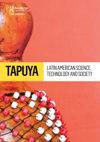莱姆利亚谈论莱姆利亚:向莱姆利亚·冈萨雷斯致敬
IF 1.2
Q2 HISTORY & PHILOSOPHY OF SCIENCE
Tapuya: Latin American Science, Technology and Society
Pub Date : 2022-09-26
DOI:10.1080/25729861.2022.2081113
引用次数: 0
摘要
本文翻译自20世纪80年代初巴西人类学家、教授、巴西黑人运动活动家lsamlia Gonzalez(1935-1994)的一次访谈。冈萨雷斯在巴西沉寂了几十年之后,如今热情地融入了人类学学术,她在这里揭示了她令人惊叹的人生旅程中的一些特点。她通过提出一种考虑种族、性别和殖民主义的方法的必要性,挑战了巴西的社会理论,并致力于与包括巴西在内的拉丁美洲现实进行公开对话。她的贡献被安吉拉·戴维斯(Angela Davis)等公共知识分子认为是必不可少的,她的重新出现与黑人运动和巴西其他社会运动提出的巴西学院非殖民化的日益增长的要求有关。以巴西葡萄牙语为原始语言的翻译是由人类学家、社会科学家和来自rec本文章由计算机程序翻译,如有差异,请以英文原文为准。
Lélia talks about Lélia: a tribute to Lélia Gonzalez
ABSTRACT This text is the translation of an interview given by Brazilian anthropologist, professor, and Brazilian Black Movement activist Lélia Gonzalez (1935–1994) at the beginning of the 1980s. Gonzalez, who is today enthusiastically incorporated into the academic anthropology after decades of silence in Brazil, exposes here some of the particularities of her stunning life itinerary. She has challenged Brazilian social theory by bringing forward the need for an approach that considers race, gender, and coloniality, and has worked towards an open dialogue with Latin American realities, including Brazil's. Her contribution has been recognized as essential by public intellectuals such as Angela Davis, and her reemergence has to do with the growing demand of decolonizing the Brazilian Academy, issued by the Black movement and other social movements in the country. The translation, having Brazilian Portuguese as the language of origin, has been made by anthropologists, social scientists, and translators from the RECânone Community Project, linking the Federal University of Rio Grande do Norte and the University of Brasília, both public centers of higher education in the country. Translators added notes aiming to help a non-Brazilian audience understand the racial, social, and cultural context where Gonzalez produced her academic and activist work.
求助全文
通过发布文献求助,成功后即可免费获取论文全文。
去求助
来源期刊

Tapuya: Latin American Science, Technology and Society
Social Sciences-Social Sciences (all)
CiteScore
1.60
自引率
0.00%
发文量
39
审稿时长
19 weeks
 求助内容:
求助内容: 应助结果提醒方式:
应助结果提醒方式:


